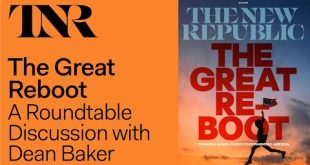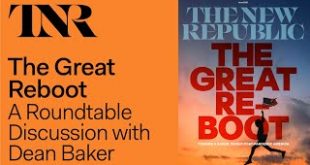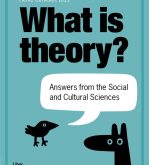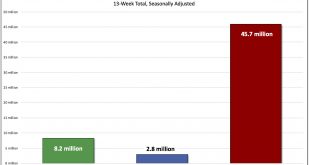from Norbert Häring From March 2021 people with an “I’ve got nothing to hide” attitude will be able to get around border and ticket controls at St Pancras International Station in London on their way to the Continent via the Eurostar, All they will have to do is upload a suitable portrait photo and a copy of their identity document to a government server. Then, instead of standing in a queue, they can walk down a camera-tagged “biometric corridor” without having to show a document. The...
Read More »TNR Live: The Great Re-Boot – A Roundtable Discussion with Dean Baker
The June issue of The New Republic included a feature by Dean Baker, “Building An Economy That Works Again – A Practical Blueprint for Reform in the Wake of the Coronavirus Shutdown”. TNR talks with Baker about the inevitable contraction of our economy and politically feasible policies he puts forth in his article that we could undertake to build a prosperous and equitable economic future. Featuring: Dean Baker – Senior economist at the Center for Economic and Policy Research and a...
Read More »TNR Live: The Great Re-Boot – A Roundtable Discussion with Dean Baker
The June issue of The New Republic included a feature by Dean Baker, “Building An Economy That Works Again – A Practical Blueprint for Reform in the Wake of the Coronavirus Shutdown”. TNR talks with Baker about the inevitable contraction of our economy and politically feasible policies he puts forth in his article that we could undertake to build a prosperous and equitable economic future. Featuring: Dean Baker – Senior economist at the Center for Economic and...
Read More »What is theory?
from Lars Syll Economics is a discipline with the avowed ambition to produce theory for the real world. But it fails in this ambition, Lars Pålsson Syll asserts in Chapter 12, at least as far as the dominant mainstream neoclassical economic theory is concerned. Overly confident in deductivistic Euclidian methodology, neoclassical economic theory lines up series of mathematical models that display elaborate internal consistency but lack clear counterparts in the real world. Such models are...
Read More »Three mega-events which shape our minds
from Asad Zaman What is the nature of the world in which I live? As I look around me, I see walls, windows, doors, and furniture. But these are insignificant parts of the world as constructed by my mind. I conceptualize the world through the teachings of history, according to which human history started in the remote past, with hunter-gatherers. I have a smattering of knowledge of the ancient civilizations of Sumeria and Babylon, and much more of the Roman Empire. The rise of...
Read More »The ultimate takedown of teflon coated defenders of rational expectations
from Lars Syll James Heckman, winner of the “Nobel Prize” in economics (2000), did an interview with John Cassidy in 2010. It’s an interesting read (Cassidy’s words in italics): What about the rational-expectations hypothesis, the other big theory associated with modern Chicago? How does that stack up now? I could tell you a story about my friend and colleague Milton Friedman. In the nineteen-seventies, we were sitting in the Ph.D. oral examination of a Chicago economist who has gone on...
Read More »Patents and the Pandemic, again
from Dean Baker I know I have been pounding on this a lot, but it is important and there is a lot of money at stake. All we need (okay, maybe not all) is some clear thinking. The Washington Post had a good piece this week talking about how a company set up by a hedge fund, with no background or expertise in pharmacology, arranged to get rights to a drug that was developed by researchers at Emory University on a $16 million contract with the government. The drug, EIDD-2801, is thought to...
Read More »45.7 million USA unemployment claims
from David Ruccio They came for him in the morning, before coffee break. — Stewart O’Nan, The Odds This morning, the U.S. Department of Labor (pdf) reported that, during the week ending last Saturday, another 1.5 million American workers filed initial claims for unemployment compensation. That’s on top of the 44.2 million workers who were laid off during the preceding twelve weeks. Here is a breakdown of each week: • week ending on 21 March—3.31 million • week ending on 28...
Read More »Freedom—pandemic edition
from David Ruccio “Formal” freedom is the freedom of choice WITHIN the coordinates of the existing power relations, while “actual” freedom designates the site of an intervention which undermines these very coordinates. — Slavoj Žižek, On Belief The novel coronavirus pandemic has demonstrated how shallow and restricted the notion of formal freedom is in the United States. After years of pretending that private healthcare and health insurance expanded the freedom...
Read More »Another financial rescue by the US Fed
from C. P. Chandrasekhar While forecasters grapple with predictions on the likely contraction in the world’s leading economies, big finance, especially in the US, seems to be prematurely preparing for its next celebration. Recall that while the post-2008 Great Recession was precipitated by the financial collapse triggered by unbridled speculation in financial markets, the subsequent ‘recovery’ from the crisis saved and rewarded finance, but left the real economy limping and workers and...
Read More » Real-World Economics Review
Real-World Economics Review






